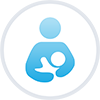Week 21

Growth spurt alert! Between week 20 and week 24 your baby will double in weight... yes, you read that right! Your baby is now about 27 cm long, about the size of a large carrot or asparagus.
You're passing along your antibodies in your blood supply, helping to protect the baby from infection. When you're pregnant, your body is very efficient at absorbing nutrients from food, so you don’t need to eat for two - but it is a good idea to try to eat sensibly.
Essential fatty acids
The essential fatty acids found in oily fish like salmon, mackerel and tuna are very good for both you and your developing baby. (Unfortunately for tinned tuna fans, only fresh tuna counts in this regard – the canning process strips most of the nutritious oils out of the fish.)
However, some types of fish aren't recommended during pregnancy, so you might want to check our foods to avoid page.
Top tips
- Avoid heavy meals in the evening – small, light meals are easier to digest. Make sure you get enough magnesium every day.
- Getting plenty of fibre, exercising and drinking enough fluids will help prevent constipation.
- Being well hydrated will also help prevent infections.
- Alternate between exercising and resting, making sure you get plenty of both.
What it’s like for the mum-to-be in week 21
From week 21, your baby will be moving more and more, which will make your pregnancy increasingly hard work as the weeks go by. For now, there’s still no obvious sign of their activity, though you may just be able to feel them moving around. If you do, you’ll instinctively respond by communicating with your baby, which they will enjoy.
Cramp in your legs
In week 21, you begin to need more and more magnesium. One way to tell is the sudden and painful cramps you may get in your legs (in particular in your calf), which are more common at night when your muscles are resting and relaxing.
The first way to minimise these symptoms is to massage the affected area to relax your muscles again, and you should now try and eat foods rich in magnesium whenever you can.
Constipation and wind
You may have irregular bowel movements as a result of the pressure your womb is now putting on your intestine. Mostly this will cause constipation, but it’s not uncommon to experience painful wind as well.
The main way to avoid constipation and wind is to increase your fluid intake and reduce your consumption of food such as cabbage, beans, garlic and onions, all of which can cause wind.
Urinary tract infections
As your pregnancy progresses, your pelvis will widen and open up, your muscles and joints will relax, and the mucous membranes in your body will become more sensitive. This makes it easier for bacteria and pathogens to get into your urethra, which may result in a bladder infection.
In week 21, your pelvis is also sensitive to cold temperatures, so make sure you keep warm and go to the toilet as often as necessary. Drinking lots of fluids is also an effective way to avoid urinary tract infections, as it helps “wash out” your urinary organs (your bladder in particular) and reduces the amount of bacteria which may have got in there.


